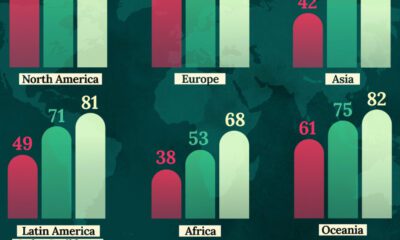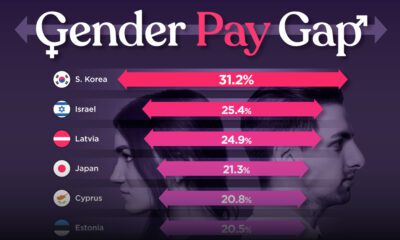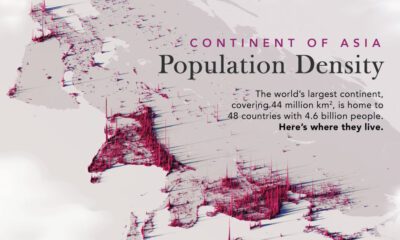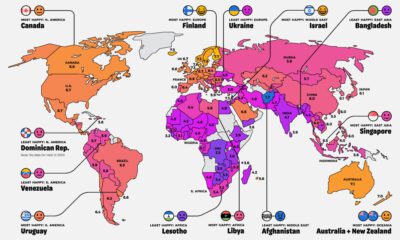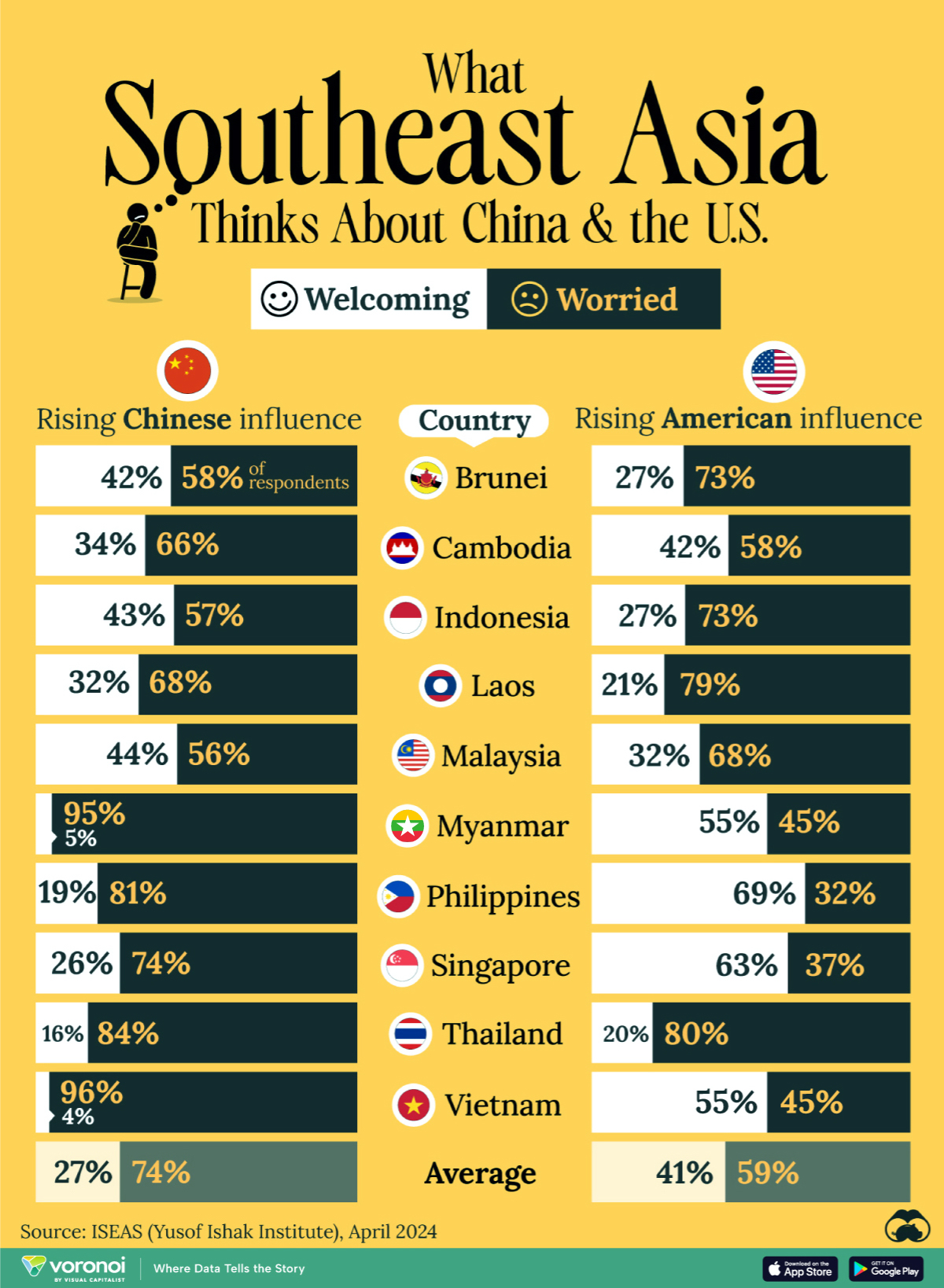Politics
Mapped: Recognition of Israel by Country
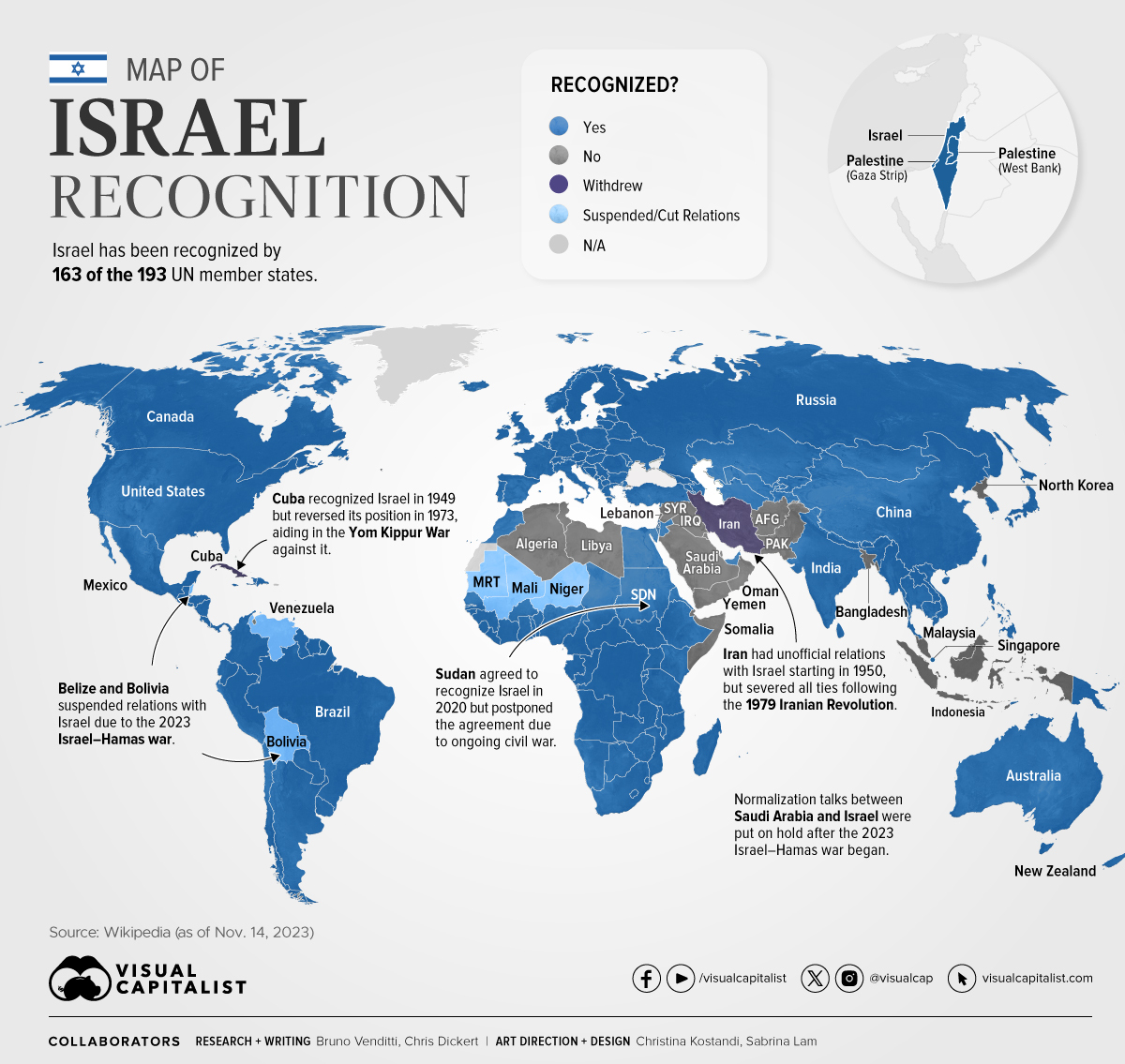
Mapped: Recognition of Israel by Country
The recognition of Israel’s sovereignty has remained a dynamic and intricate issue since its establishment in 1948.
In the graphic above, we use Wikipedia data to map the countries that currently recognize Israel as a state and those that don’t. The post reflects data as of November 14, 2023, when Belize suspended diplomatic relations with Israel over the Israel-Hamas War.
This post is a companion piece to our map showing the recognition of Palestine by country.
30 Countries Do Not Recognize Israel
As of November 2023, 163 of the 193 UN members recognize Israel as a state, including all G7 countries. Even the State of Palestine recognized Israel as part of the Oslo Accords in 1993.
Here are the 30 countries that don’t recognize Israel:
| State | Recognized Israel? |
|---|---|
| 🇦🇫 Afghanistan | Never |
| 🇩🇿 Algeria | Never |
| 🇧🇩 Bangladesh | Never |
| 🇧🇿 Belize | Suspended/Cut Relations |
| 🇧🇴 Bolivia | Suspended/Cut Relations |
| 🇧🇳 Brunei | Never |
| 🇰🇲 Comoros | Never |
| 🇨🇺 Cuba | Withdrew |
| 🇩🇯 Djibouti | Never |
| 🇮🇩 Indonesia | Never |
| 🇮🇷 Iran | Withdrew |
| 🇮🇶 Iraq | Never |
| 🇰🇼 Kuwait | Never |
| 🇱🇧 Lebanon | Never |
| 🇱🇾 Libya | Never |
| 🇲🇾 Malaysia | Never |
| 🇲🇻 Maldives | Suspended/Cut Relations |
| 🇲🇱 Mali | Suspended/Cut Relations |
| 🇲🇷 Mauritania | Suspended/Cut Relations |
| 🇳🇪 Niger | Suspended/Cut Relations |
| 🇰🇵 North Korea | Never |
| 🇴🇲 Oman | Never |
| 🇵🇰 Pakistan | Never |
| 🇶🇦 Qatar | Never |
| 🇸🇦 Saudi Arabia | Never |
| 🇸🇴 Somalia | Never |
| 🇸🇾 Syria | Never |
| 🇹🇳 Tunisia | Never |
| 🇻🇪 Venezuela | Suspended/Cut Relations |
| 🇾🇪 Yemen | Never |
With the exception of five countries—Belize, Bolivia, Cuba, North Korea, Venezuela—the countries that do not recognize Israel are predominantly Muslim.
Iraq, Lebanon, and Syria have never recognized Israel and technically remain in a state of war with the country. Iran also doesn’t recognize Israel, but actually had relations with the country in the past before severing all ties following the 1979 Iranian Revolution.
Likewise, Cuba recognized Israel in 1949, but reversed its position in 1973 and actively supported Egypt and Syria against it during that year’s Yom Kippur War.
On the other hand, some Muslim-majority countries including Egypt, Jordan, and the UAE, have gradually normalized with the country.
Effects of the Israel-Hamas War
Relations between Israel and other countries are often strained when it engages in military conflicts, especially in the Gaza Strip.
In some cases those relations have broken completely. Venezuela broke all diplomatic ties with Israel during the 2008–2009 Israel–Gaza conflict. More recently, in addition to Belize, Bolivia cut official ties with Israel over the ongoing Israel-Hamas War.
As of November 2023, 84% of UN members recognized Israel as a country, compared to 72% for the State of Palestine.
United States
Charted: What Southeast Asia Thinks About China & the U.S.
A significant share of respondents from an ASEAN-focused survey are not happy about rising American and Chinese influence in the region.
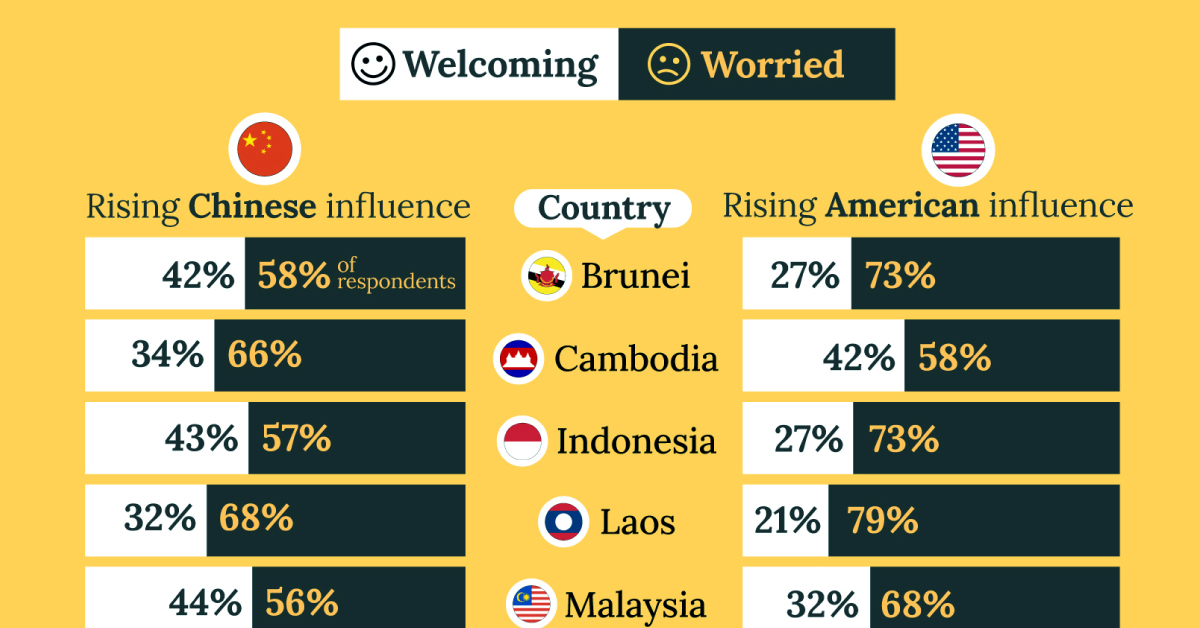
What Southeast Asia Thinks About China & the U.S.
This was originally posted on our Voronoi app. Download the app for free on iOS or Android and discover incredible data-driven charts from a variety of trusted sources.
This chart visualizes the results of a 2024 survey conducted by the ASEAN Studies Centre at the ISEAS-Yusof Ishak Institute. Nearly 2,000 respondents were asked if they were worried or welcoming of rising Chinese and American geopolitical influence in their country.
The countries surveyed all belong to the Association of Southeast Asian Nations (ASEAN), a political and economic union of 10 states in Southeast Asia.
Feelings Towards China
On average, a significant share of respondents from all 10 countries are worried about rising influence from both the U.S. and China.
However, overall skepticism is higher for China, at 74% (versus 59% for U.S.).
| Country | Worried About Growing 🇨🇳 Influence | Welcome Growing 🇨🇳 Influence |
|---|---|---|
| 🇧🇳 Brunei | 58% | 42% |
| 🇰🇭 Cambodia | 66% | 34% |
| 🇮🇩 Indonesia | 57% | 43% |
| 🇱🇦 Laos | 68% | 32% |
| 🇲🇾 Malaysia | 56% | 44% |
| 🇲🇲 Myanmar | 95% | 5% |
| 🇵🇭 Philippines | 81% | 19% |
| 🇸🇬 Singapore | 74% | 26% |
| 🇹🇭 Thailand | 84% | 16% |
| 🇻🇳 Vietnam | 96% | 4% |
| Average | 74% | 27% |
The recently-cooled but still active territorial concerns over the South China Sea may play a significant role in these responses, especially in countries which are also claimants over the sea.
For example, in Vietnam over 95% of respondents said they were worried about China’s growing influence.
Feelings Towards America
Conversely, rising American influence is welcomed in two countries with competing claims in the South China Sea, the Philippines (69%) and Vietnam (55%).
| Country | Worried About Growing 🇺🇸 Influence | Welcome Growing 🇺🇸 Influence |
|---|---|---|
| 🇧🇳 Brunei | 73% | 27% |
| 🇰🇭 Cambodia | 58% | 42% |
| 🇮🇩 Indonesia | 73% | 27% |
| 🇱🇦 Laos | 79% | 21% |
| 🇲🇾 Malaysia | 68% | 32% |
| 🇲🇲 Myanmar | 45% | 55% |
| 🇵🇭 Philippines | 32% | 69% |
| 🇸🇬 Singapore | 37% | 63% |
| 🇹🇭 Thailand | 80% | 20% |
| 🇻🇳 Vietnam | 45% | 55% |
| Average | 59% | 41% |
Despite this, on a regional average, more respondents worry about growing American influence (59%) than they welcome it (41%).
Interestingly, it seems almost every ASEAN nation has a clear preference for one superpower over the other.
The only exception is Thailand, where those surveyed were not a fan of either option, with 84% worried about China, and 80% worried about the U.S.
-
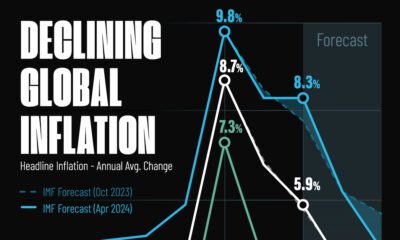
 Markets5 days ago
Markets5 days agoVisualizing Global Inflation Forecasts (2024-2026)
-

 Green2 weeks ago
Green2 weeks agoThe Carbon Footprint of Major Travel Methods
-

 United States2 weeks ago
United States2 weeks agoVisualizing the Most Common Pets in the U.S.
-

 Culture2 weeks ago
Culture2 weeks agoThe World’s Top Media Franchises by All-Time Revenue
-
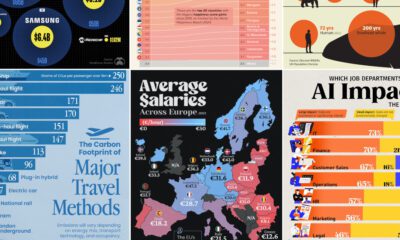
 voronoi1 week ago
voronoi1 week agoBest Visualizations of April on the Voronoi App
-
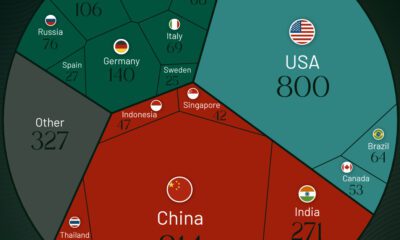
 Wealth1 week ago
Wealth1 week agoCharted: Which Country Has the Most Billionaires in 2024?
-
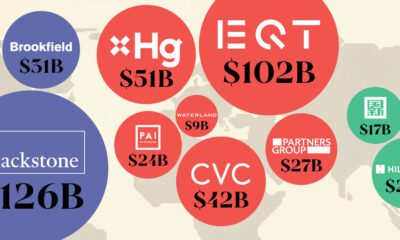
 Business1 week ago
Business1 week agoThe Top Private Equity Firms by Country
-

 Markets1 week ago
Markets1 week agoThe Best U.S. Companies to Work for According to LinkedIn

